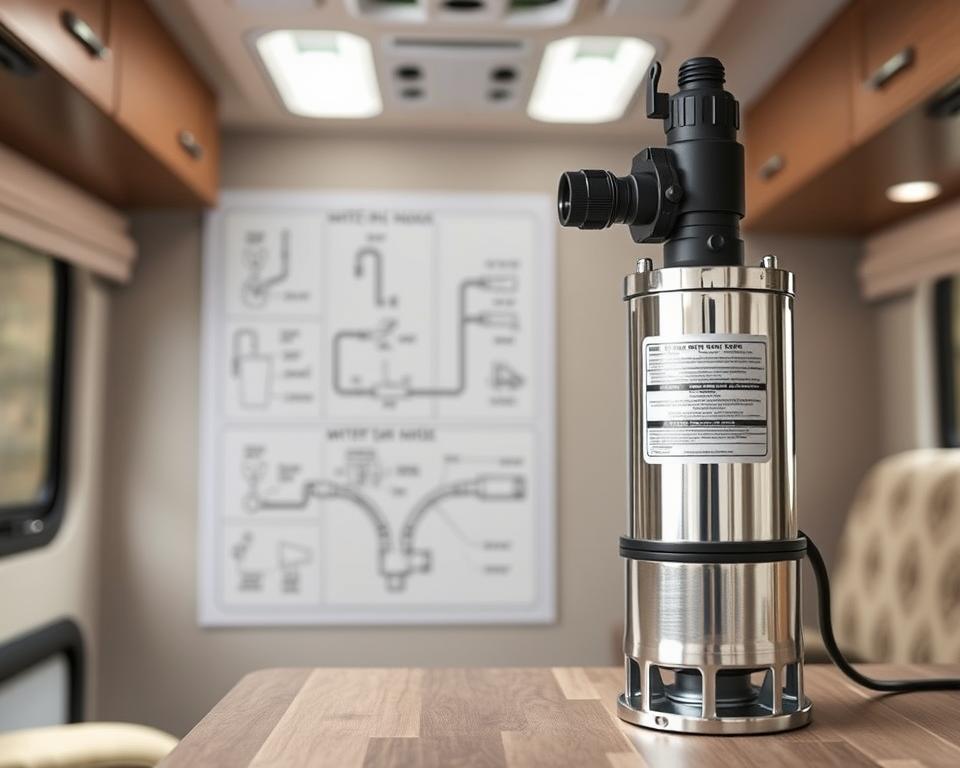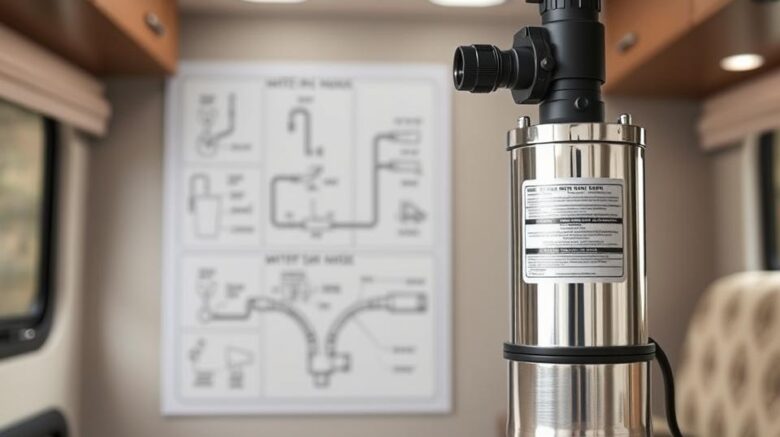Travel Trailer Septic Tank Pumping – Must-Read Guide
Have you thought about the fall-out of disregarding your RV’s septic system? If you travel with an RV or mobile rig, it’s critical to grasp the essence of trailer septic Tank Pumping. It secures your journeys are uninterrupted and living conditions stay sanitary on the road. By stressing regular camper septic pumping, this guide seeks to make you prepared in maintaining your septic system, avoiding potential problems — particularly while soaking up the great outdoors.
Within these pages, an in-depth insight into finding solid mobile septic services awaits you. On top of that, learn to detect when your septic Tank demands prompt attention. Grasping the process for effective RV septic Tank Pumping completes the picture. Instead of responding to issues as they surface, allow this guide to arm you with essential knowledge. This helps guarantee your RV experiences stay carefree!
The Value of Routine RV Septic Tank Pumping
Timely servicing of your trailer’s septic Tank is crucial for its wastewater system’s efficiency. Skipping this can lead to clogs and backups, dampening your enjoyment and impacting the environment. Sewage leaks from an overloaded Tank can contaminate the area, creating major hazards.
Teaming up with professional Pumping services like All-In Sanitation makes sense for RV owners. This step heads off issues and extends your system’s functionality and longevity. On-schedule Pump-outs deliver a cleaner, safer environment in RV parks and campgrounds.
Understanding Your Travel Trailer’s Septic System
A motorhome septic system features three primary elements: the black water Tank, grey water Tank, and fresh water Tank. For RV owners, it’s critical to know these parts. They are central in waste management. The black water Tank contains toilet sewage, and the grey water Tank holds water from sinks and showers.
Each Tank has a distinct role in ensuring the rig sanitary and operational. Checking the levels in the black water and grey water Tanks is important. It prevents overflows, bad smells, and damage to the septic system.
To clarify, below is a table that lays out differences between the black water and grey water Tanks:
| Feature | Black Water Tank | Grey Water Tank |
|---|---|---|
| Purpose | Stores sewage waste | Collects wastewater from sinks and showers |
| Maintenance Frequency | Requires regular Pumping | Needs less frequent emptying |
| Potential Issues | Odors, blockages from solids | Risk of grease buildup |
| Typical Size | Generally bigger than grey water Tank | Smaller than black water Tank typically |
Knowing your trailer’s septic system is the bedrock for maintenance. It ensures hassle-free travel experiences. Managing both Tanks translates to trips with no septic concerns.

Clues Your Septic Tank Needs Pumping
It’s critical to notice when your septic Tank needs Pumping to preserve your system efficient. Detecting issues early can help avoid major repairs and environmental harm. Key signs that call for attention include:
- Slow draining sinks, which may indicate a full Tank or clog.
- Gurgling toilets, signaling blocked pipes or a failing septic system.
- Foul odors around your RV, an early warning of rising sewage.
- Pooling water near the drain field, revealing that your Tank may be overwhelmed.
- Sewage backups in your toilets or drains, a clear sign immediate action is needed.
Being mindful of these signs enables RV owners to act swiftly, preventing grave issues. Keeping tabs on your system and responding to these indicators can extend your septic system’s lifespan. This approach leads to a more enjoyable trailer experience.
Variables Impacting Pumping Frequency
A septic Tank’s volume significantly affects how often it needs Pumping. Larger Tanks demand fewer service because they hold more waste, while smaller Tanks demand closer-interval Pumping.
The number of RVs using the septic system also affects Pumping frequency. With more RVs, the system experiences increased strain, necessitating quicker Pumping. Particularly in peak seasons, altering the schedule is key to avoid problems.
Here is a table that highlights recommended Pumping intervals based on typical scenarios:
| Septic Tank Size | Number of RVs | Recommended Pumping Frequency |
|---|---|---|
| 500 gallons | 1-2 RVs | Roughly every 2-3 years |
| 1000 gallons | 2-4 RVs | Roughly 3-5 years |
| 1500 gallons | 4+ RVs | As often as 1-2 years |
Properly choosing your septic Tank’s Pumping frequency boosts its operation. It also increases its life and efficiency. This choice is critical for maintaining system health.
Selecting a Reliable Septic Pumping Service
Choosing a reliable septic Pumping service is critical for your RV’s septic system health. It ensures prompt and thorough Pumping, avoiding costly future repairs. When looking for a septic service provider, weigh these critical aspects:
- Experience: Prefer companies with a strong track record. Their familiarity with various septic systems, especially those for mobile rigs, is paramount.
- Customer Reviews: Explore online reviews and testimonials. Positive feedback and strong ratings are markers of a dependable provider.
- Response Time: Quick response times reflect a company’s commitment to their customers and willingness to meet their needs efficiently.
- Knowledge of Systems: Specialized knowledge of trailer septic systems distinguishes some services. Providers like All in Sanitation grasp these systems well, enabling tailored service.
Prioritize these considerations to secure the most suitable service for your septic requirements. A dependable septic Pumping service enhances your system’s life and performance, allowing for carefree travel adventures.
RV Septic Tank Pumping: How It Works
Trailer septic Tank Pumping includes essential steps for efficiency and safety. It’s vital for RV owners to know this process before service appointments.
A technician with a trailer-mounted Pump arrives first, tailored to mobile systems. This technology allows effective waste removal while defending the environment. They attach the Pump to the trailer’s system with a hose reaching the Tank.
The Pump then pulls the waste out of the Tank. This action is critical to preserve the septic system operational and avoid overflow. After emptying, the technician checks the Tank for damage or wear, ensuring proper function.
Following the Pump-out, waste disposal is necessary. The hauled waste is taken to treatment facilities for safe processing. This step minimizes environmental harm.
The process benefits from the trailer-mounted Pump’s speed. Regular service cuts time and cost, keeping the septic system in optimal condition.
Rapid-Response Septic Pumping Services
Unplanned issues with your septic system can require immediate intervention. For RV enthusiasts, knowing when to request emergency septic Pumping is crucial to avoid further damage and hefty costs. Situations demanding immediate septic Tank Pumping include backups, unpleasant smells, and sewage leaks. Swiftly handling these issues often requires septic Tank Pump and haul services to efficiently eliminate waste and restore system functionality.
Providers like All in Sanitation offer 24/7 emergency septic Pumping, assuring help is always available in a pinch. Acting fast with these services markedly enhances your septic system’s lifespan and performance. Having a trusted septic service close at hand can mitigate expenses and stress in emergencies, guaranteeing uninterrupted enjoyment of RV adventures.
Pointers for Caring for Your RV Septic System
Keeping your trailer’s septic system in excellent shape is essential. Effective maintenance strategies can prevent costly problems later. Kick off with regular checks for damage, leaks, or strange smells for RV septic Tank care.
Proper waste disposal is central for a healthy system. Do not flush items that won’t break down, and use septic-friendly products. It’s important that everyone understands how their actions influence the septic system. This ensures it remains functional and efficient.
- Conduct periodic checks for leaks and unusual odors.
- Stay in touch with your septic service provider for timely maintenance.
- Utilize septic-safe toilet paper and cleaning supplies.
- Refrain from pouring chemicals down the drain that could damage the balance of bacteria in the Tank.
- Schedule for regular professional inspections to catch potential issues early.
Adopting these steps helps RV owners lengthen their trailer septic systems’ life and performance.
Frequent Challenges with Trailer Septic Systems
Mobile septic systems often encounter issues that plague RV owners. Handle these issues early to avoid bigger problems later. Clogs in septic Tanks are common, mainly due to not disposing of waste properly. To avoid clogs, stick with RV-safe toilet paper and conduct regular maintenance.
Another key issue is odor control. Bad smells can suggest backups or leaks, demanding immediate action. To cut odors, verify the system is well-ventilated and the septic Tank is emptied as needed.
Leaks can develop from wear or incorrect installations. Fast identification of leaks aids preventing environmental damage and preserves the system working. Regular inspections are important to catch these issues early.
To avoid common issues, implement preventative strategies like scheduled maintenance and proper waste disposal. Knowledgeable and proactive RV owners can savor their travels care-free and with peace of mind.
To Conclude
Understanding trailer septic Tank Pumping is key for RV and trailer owners. Regular maintenance and recognizing trouble signs in your septic system can boost your RVing experience dramatically. Managing your RV’s septic system well secures both safety and comfort during your outdoor adventures.
Selecting a trustworthy service for your trailer’s septic Tank Pumping is vital. Hiring experts like All in Sanitation secures your mobile waste management is first-rate. This approach is not just environmentally sound, but it also improves the camping experience, making it more enjoyable and sustainable.
Actively maintaining your septic system cuts emergencies, improving your nature stays. Proper care and knowledge enable memorable trips for the best reasons.
